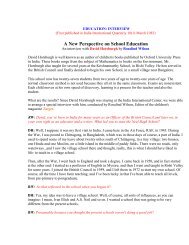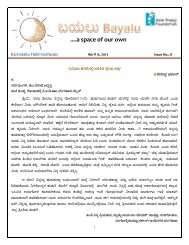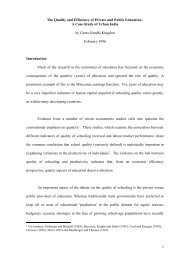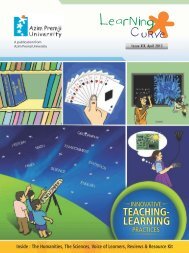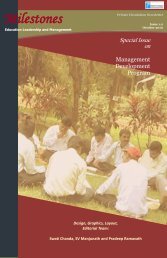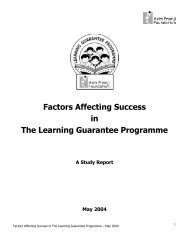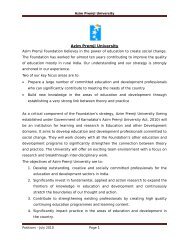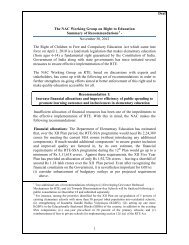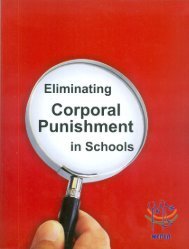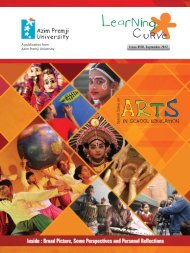Indesign Pagesnew.indd - Azim Premji Foundation
Indesign Pagesnew.indd - Azim Premji Foundation
Indesign Pagesnew.indd - Azim Premji Foundation
You also want an ePaper? Increase the reach of your titles
YUMPU automatically turns print PDFs into web optimized ePapers that Google loves.
initially believe that history is just “there” and doesn’t have to<br />
be constructed from historical sources or that events happen<br />
because historical actors want them to: teaching history as<br />
a discipline is not easy.<br />
Looking ahead: Emerging Ideas for History<br />
Education<br />
The media regularly reports that both American and English<br />
students know very little about the past, despite years of<br />
history education. While such concerns are decades-old<br />
and framed simplistically, something is arguably amiss. In<br />
England, the worry is that students can’t build up a coherent<br />
picture of the past because they are too busy practicing their<br />
historical thinking ‘skills’ on random topics. In America, where<br />
greater emphasis is placed on learning facts in chronological<br />
order, students seem unable—or unmotivated—to retain<br />
what they are supposed to have learnt.<br />
Recently there has been growing interest in the concept<br />
of “historical consciousness” as a means of re-imagining<br />
teaching history as a discipline. Historical consciousness<br />
broadly refers to how as humans we situate ourselves in<br />
time and relate our lives to the past and future; it is about<br />
using the past to understand who we are and the lives we<br />
are living and can expect to live. For example, experts like<br />
Peter Lee are currently interested in developing ‘usable<br />
historical frameworks’ that would help to structure students’<br />
understanding of the past; these frameworks would help<br />
students assimilate and organize new knowledge but not<br />
in a rigid or dogmatic way as in ‘traditional’ teaching. Such<br />
Some Suggested Resources<br />
1.<br />
2.<br />
3.<br />
Section B<br />
Issues in History Education: Perspectives from England and the USA<br />
frameworks, which would encompass the history of humanity<br />
as a whole, would initially be taught quickly but would be<br />
continually revisited, adapted and critiqued as students’<br />
disciplinary knowledge became more sophisticated. Students<br />
would also be encouraged to make connections between the<br />
present-day and the past.<br />
Many developments in history education have been driven<br />
by research. However, many decisions about what to teach<br />
and how to teach it boil down to the bigger question of why<br />
teach history? Those who believe that the most important<br />
reason for teaching history is to make young people feel<br />
proud of their nation’s past, for instance, will obviously have<br />
different ideas about what to teach and how to teach it than<br />
those who are more concerned with developing students’<br />
disciplinary understanding of history, including how we<br />
even know about the past and why there might be different<br />
interpretations of the same event. Somewhat different again<br />
will be the practices of educators whose primary goal is to<br />
help students understand how they fi t into a bigger picture<br />
of human history and can use the past to orient their own<br />
lives. Of course, there are other potential purposes of history<br />
education that I haven’t touched on here, such as teaching<br />
students moral or religious lessons and/or inspiring them to<br />
become politically or socially engaged; again, holding these<br />
as priorities will affect practice. Given that the purpose of<br />
history education is a matter of opinion, debates about<br />
history education are likely to continue for a very long time—<br />
and not just in America and England.<br />
Benchmarks of historical thinking website, Center for the Study of Historical Consciousness, Canada: http://www.histori.ca/benchmarks/<br />
English National Curriculum: http://curriculum.qcda.gov.uk/key-stages-3-and-4/subjects/key-stage-3/history/index.aspx<br />
History Thinking Matters, resources for history teachers: http://historicalthinkingmatters.org/<br />
Liz Dawes Duraisingh is a doctoral student at the Harvard Graduate School of Education, writing her<br />
dissertation on how young people use history to think about themselves. She previously taught history in<br />
England and Australia.<br />
Pg No: 74



